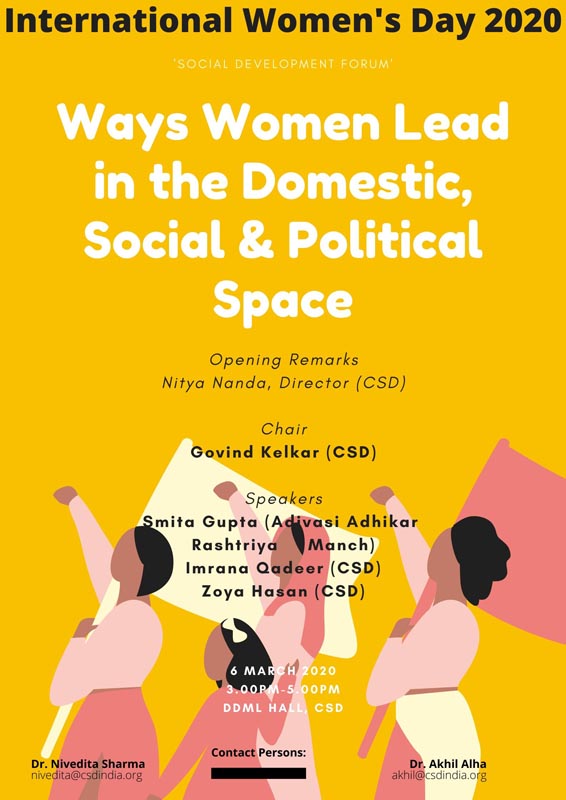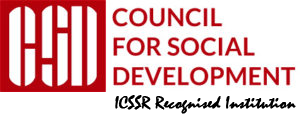
Schedule of the Programme
Welcome and Opening Remarks
Dr. Nitya Nanda
Director, CSD New Delhi
Speakers
- Ms. Smita Gupta
Adivasi Adhikar Rashtriya Manch - Prof. Imrana Qadeer
Council for Social Development, New Delhi - Prof. Zoya Hasan
Council for Social Development, New Delhi
Chair
Prof Govind Kelkar
Council for Social Development, New Delhi
Date: March 6, 2020 (Friday)
Time: 3:00-5:00 PM
Venue: Durgabai Deshmukh Memorial Lecture Hall, CSD, Sangha Rachna, 53 Lodi Estate, New Delhi 110003
We sincerely hope that you will join and enrich the panel discussion.
Dr Nivedita Sharma Dr Akhil Alha
(nivedita@csdindia.org) (akhil@csdindia.org)
“I measure the progress of a community by the degree of progress women have achieved”
-Dr. B. R. Ambedkar
Gender-based issues have had a long standing history in the academic, social and policy circles world-wide. The issues are multiple, highly varied, complex and multi-layered. Inquiries into these issues reveal deep-rooted inequalities, explicit as well as implicit, that have fostered discrimination across space and time with negative consequences on the overall development and well-being of women.
In the domestic sphere, women of the household not only have fewer resources but also face disproportionate burden of unpaid house-work. All these inequalities are both a cause and effect of low status of women in the house and their minimal participation in the decision-making process. Further, patterns of social hierarchies, dominance of patriarchal systems and cultural and religious norms have fostered a society where women have been denied the right to make strategic choices/decisions about their lives; to go out and work, to access education & skill-development, to access productive resources, to access healthcare etc. Also, class and caste based discrimination further add to the vulnerabilities of the women.
Another important aspect of overall well-being is availability of adequate exposure to political life. Even in the era of highly-representative governments, the role of women in public life is substantially limited, in most developed nations as well. Lack of political participation by women exists both in terms of active involvement as representatives and also as a group to be represented. Women’s ability to organize themselves in social groups, self-help groups or other groups for mutual benefits including religious and community- based organizations reflects the magnitude of liberality among citizens of the society in accepting women in public life. Access to political decision-making has long-term consequences for the equitable development of the society.
Earlier there was an overall lack of consciousness and understanding about the structures of patriarchy functioning within families, homes and society at large. Women were indeed ignored. But this very ignorance generated a counter-intuitive process of delving deep into individual experiences, and unpacking patriarchy through them. It gave birth to new perspectives, a feminist consciousness, reflections on the productive and reproductive roles of women, their practical and strategic needs, the impact of patriarchy on women’s individual and collective lives and their abilities to cope, counter, and resolve. There is thus increased awareness level of women in the domestic, social and political space and the participation of women is evolving in reclaiming their rights.
It is in this context that Social Development Forum of Council for Social Development, New Delhi would like to observe International Women’s Day with a panel discussion on
